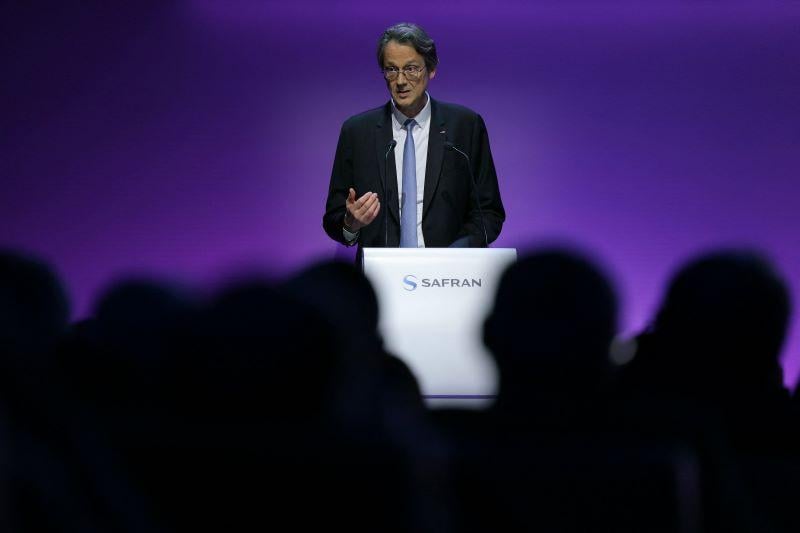This article is published in Aviation Daily part of Aviation Week Intelligence Network (AWIN), and is complimentary through Nov 04, 2024. For information on becoming an AWIN Member to access more content like this, click here.

Safran CEO Olivier Andries during a general meeting of shareholders on May 23, 2024.
LYON—As the strike at Boeing is seriously impacting the airframer’s supply chain, Safran is taking action to protect its own suppliers, Safran CEO Olivier Andries said on the company’s third quarter (Q3) financial review conference call Oct. 25.
While a large company has deep enough pockets to withstand such a crisis, smaller, financially weaker players could be destabilized. Safran’s move has been usual in the French aerospace industry, the members of which show solidarity in crises. Whether Safran’s support suffices to save those suppliers remains to be seen. A number of them are already struggling to find working capital in the context of post-pandemic production ramp-up.
CFM International—Safran’s joint venture with GE Aerospace—is planning on delivering 10% fewer Leap engines in 2024, compared to 2023. The new forecast is the third downgrade since Safran’s initial outlook in February, which indicated a 20-25% increase. Successive problems at Boeing’s and suppliers’ levels caused the downward revisions of Leap production targets.
On the supplier side, high-pressure turbine (HPT) blades are still pacing Leap manufacturing. In July, it emerged that supplier Howmet Aerospace had slowed down production. “That supplier’s yield is improving but is still below expectations,” Andries said, without naming Howmet.
Last July, Airbus CEO Guillaume Faury complained about late CFM Leap 1A deliveries. Every week, Safran makes allocation decisions between airframers and operators, Andries said. While Airbus needs engines for aircraft final assembly, carriers expect spare engines. Spare engines account for a low-double-digit share in total Leap deliveries, Andries said.
Meanwhile, Boeing is still accepting the Leap 1B engines CFM is shipping at an unspecified frequency, Andries said. The airframer has a three-digit-number of engines in excess, compared to what it needs in its predicament, he added.
Consequently, Safran finds itself with inventory in complete engines and low-pressure spools, the portion of the Leap the company manufactures. “We could decide to reduce our inventory next year but that would badly impact our suppliers,” Andries said. “So, we will soften the impact for our supply chain.” Safran will thus continue to take delivery of its suppliers’ components.
The goal is to keep the supply chain healthy for it to be ready when needed. Airbus’ production ramp-up on the A320neo family is happening and Boeing 737 MAX production will restart, Andries said.
In Q3, CFM delivered 365 Leaps. Despite a 68-unit increase over the second quarter, that number was still 24 units below the same period in 2023. Andries is planning on an improvement in the fourth quarter.
The 737 MAX production stoppage is also impacting Safran’s equipment business. Wiring kit deliveries have been suspended, Andries said.
The strike has no effect on the 787 program, for which Safran continues to deliver landing gears, he noted. After a difficult first half of the year due to a strike in a Safran factory in Montreal, landing gear deliveries for the A330neo are back on track, at four shipsets per month, Andries said.
“The situation with our supply chain is progressively improving, but not to a point I could say all issues are going to be behind us in 2025,” he added. Safran is still closely following 20 suppliers, characterized as critical for engine, cabin interior and equipment production.






Comments
Boeing's 120 day payment lag will be a distant memory, 30 days may become the norm for larger suppliers. Smaller ones may be more draconian, COD for example; or if they are really upset CWO!!